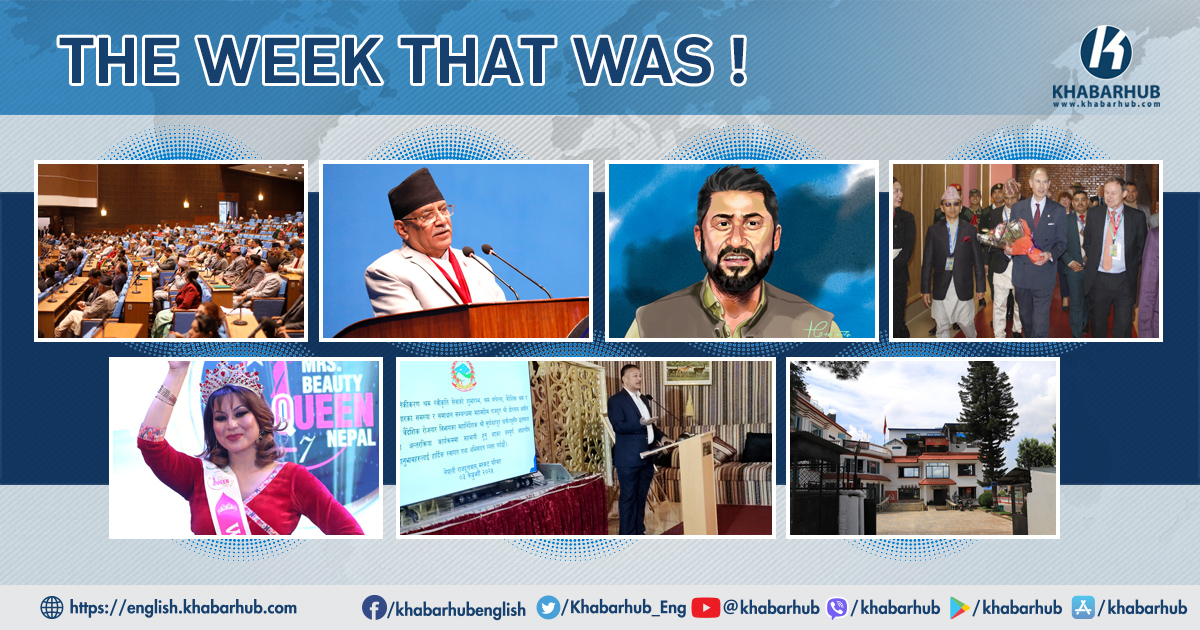KATHMANDU: The events from last week present a mix of political developments, economic updates, cultural celebrations, and diplomatic interactions in Nepal.
Last week’s events in Nepal reflect a combination of political maneuvering, economic concerns, diplomatic exchanges, and cultural activities.
Politically, the government is focusing on governance reforms, development, and legal proceedings, while opposition forces are preparing for challenges. Economic data reveals inflationary pressures, especially in essential goods.
Meanwhile, the diplomatic visit of the British royal family and the introduction of labor permits in Oman are significant international steps for Nepal.
On the cultural front, the Saraswati Puja serves as a spiritual moment for many, while the beauty pageant for married women symbolizes growing empowerment.
These events indicate ongoing change and development in various spheres of Nepali society. Here’s a breakdown of key highlights:
Political Developments:
Ordinances Tabled in Parliament: The government took proactive steps to amend laws for more effective public service delivery.
Minister Prithvi Subba Gurung presented the “Ordinance designed to amend some Nepal Acts on Promotion of Good Governance and Public Service Delivery, 2081,” signaling efforts to improve governance and services, especially in public sectors.
Maoist Center’s Nationwide Campaign: The Maoist Center’s announcement of a six-month national campaign starting from Jhapa adds another layer of political activity, likely aimed at consolidating support and public visibility.
With a route connecting key areas and concluding at the foothills of Mount Everest, this campaign focuses on regional connectivity, symbolized by the “Hulaki Highway.”
Prachanda’s Opposition Speech: Chairman Pushpa Kamal Dahal, also known as Prachanda, voiced strong dissatisfaction with the current government, warning of a shift in power.
His rhetoric about “reopening criminal files” signals a readiness to challenge corruption and vested interests.
This speech highlights the ongoing political polarization in Nepal, with the opposition positioning itself against the ruling party’s leadership.
PM Oli’s Development Promises: In contrast, Prime Minister KP Sharma Oli focused on development, emphasizing the completion of ongoing projects on time.
His claim of disbursing Rs 30 billion to contractors may reflect an effort to reassure the public and contractors of the government’s commitment to infrastructure development.
Court Decision on Rabi Lamichhane: The Chitwan District Court’s decision to grant bail to Rabi Lamichhane, a prominent political figure from the Rastriya Swatantra Party, on charges of embezzling funds from Sahara Cooperative, was a significant legal development.
Lamichhane’s release on bail amidst this controversy brings to the forefront ongoing concerns about corruption and justice in Nepal.
Economic Indicators:
Consumer Price Inflation: Consumer price inflation at 5.41% is slightly up from the previous year, with food and beverage inflation standing at a notable 7.67%.
The rise in inflation, particularly for essential items like vegetables and ghee, points to challenges in consumer purchasing power.
This could influence public sentiment, especially as the cost of living rises for everyday citizens.
Government Expenditure and Revenue Mobilization: The report from Nepal Rastra Bank reveals total government expenditure of Rs 667.60 billion for the first six months of the fiscal year, with significant allocations to recurrent spending, capital expenditure, and financial expenditure.
However, the total revenue of Rs 559.61 billion shows a potential shortfall in balancing the national budget, especially given the disparity between expenditure and revenue generation.
Cultural and Diplomatic Events:
Saraswati Puja: The religious celebration of Saraswati Puja, revered as the Goddess of Knowledge, was widely observed.
Students and devotees prayed for wisdom and success, particularly in the context of education.
This day also marked an auspicious occasion for initiating learning, aligning with Nepal’s cultural and educational practices.
Royal Visit by Prince Edward: Prince Edward’s official visit to Nepal, accompanied by his wife Sophie, represents an important diplomatic engagement.
Their interaction with the President and participation in programs related to the British Gurkha Camp in Pokhara highlights the historical connection between Nepal and the British royal family.
Their visit may also deepen cultural and bilateral ties.
International Affairs:
Nepali Embassy in Oman Issues Labor Permits: The new initiative by the Nepali Embassy in Oman to issue labor permits directly is a significant step towards improving the welfare of Nepali workers abroad.
This move is expected to provide legal protections and better benefits for workers, addressing concerns related to labor migration and exploitation.
Public Recognition:
Mrs Beauty Queen Nepal: Barsha Kunwar’s victory in the “Mrs Beauty Queen Nepal” competition brought attention to empowering married women, demonstrating the role of such events in promoting confidence and fostering societal change.
Her win, along with recognition of the other contestants, highlighted the celebration of beauty and talent.









Comment